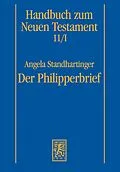Angela Standhartinger interprets the Epistle to the Philippians as a prisoner's correspondence with his favorite congregation. She integrates religious and socio-historical source material in a theological interpretation of the Greek text. The work contains an extended introduction and eighteen excursuses which provide information about significant topics such as the ancient city of Philippi, collected letters, humility, the Philippian hymn, mimesis, community structure and leadership of an early Pauline congregation and greetings from the house of Caesar.
In her philological-historical interpretation, Angela Standhartinger puts Philippians into its religious and cultural setting and provides a theological interpretation of individual parts and Philippians as a whole. Recent research on Philippi shows that the letter was addressed to a congregation located at the edge of Philippi, a minor Roman colony. Paul wrote to them as a prisoner subjected to the usual severe conditions of a Roman prison. These three letters to his favorite congregation were written at the beginning of the second century as a farewell to thank them for their support and to exhort them to continue to survive in spite of what he presumed was his impending execution. As many prisoners did, Paul only hints at some messages in order to keep them from being read by others or by his jailers. This work will provide readers with source material and theological reflection in order to enable them to do their own interpretation of the material.
Autorentext
Born 1964; 1994 PhD; 1998 Habilitation at Goethe-Universität Frankfurt/Main; Vicariate and Ordination in EKHN; Visiting Researcher at Union Theological Seminary, New York; 2024-25 president of the SNTS; Professor of New Testament at Philipps-Universität Marburg.
In her philological-historical interpretation, Angela Standhartinger puts Philippians into its religious and cultural setting and provides a theological interpretation of individual parts and Philippians as a whole. Recent research on Philippi shows that the letter was addressed to a congregation located at the edge of Philippi, a minor Roman colony. Paul wrote to them as a prisoner subjected to the usual severe conditions of a Roman prison. These three letters to his favorite congregation were written at the beginning of the second century as a farewell to thank them for their support and to exhort them to continue to survive in spite of what he presumed was his impending execution. As many prisoners did, Paul only hints at some messages in order to keep them from being read by others or by his jailers. This work will provide readers with source material and theological reflection in order to enable them to do their own interpretation of the material.
Autorentext
Born 1964; 1994 PhD; 1998 Habilitation at Goethe-Universität Frankfurt/Main; Vicariate and Ordination in EKHN; Visiting Researcher at Union Theological Seminary, New York; 2024-25 president of the SNTS; Professor of New Testament at Philipps-Universität Marburg.
Titel
Der Philipperbrief
Autor
EAN
9783161601033
Format
E-Book (pdf)
Hersteller
Genre
Digitaler Kopierschutz
Adobe-DRM
Dateigrösse
2.71 MB
Anzahl Seiten
317
Lesemotiv
Unerwartete Verzögerung
Ups, ein Fehler ist aufgetreten. Bitte versuchen Sie es später noch einmal.
